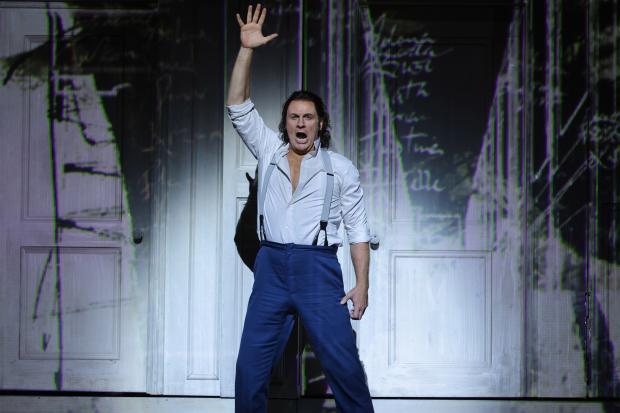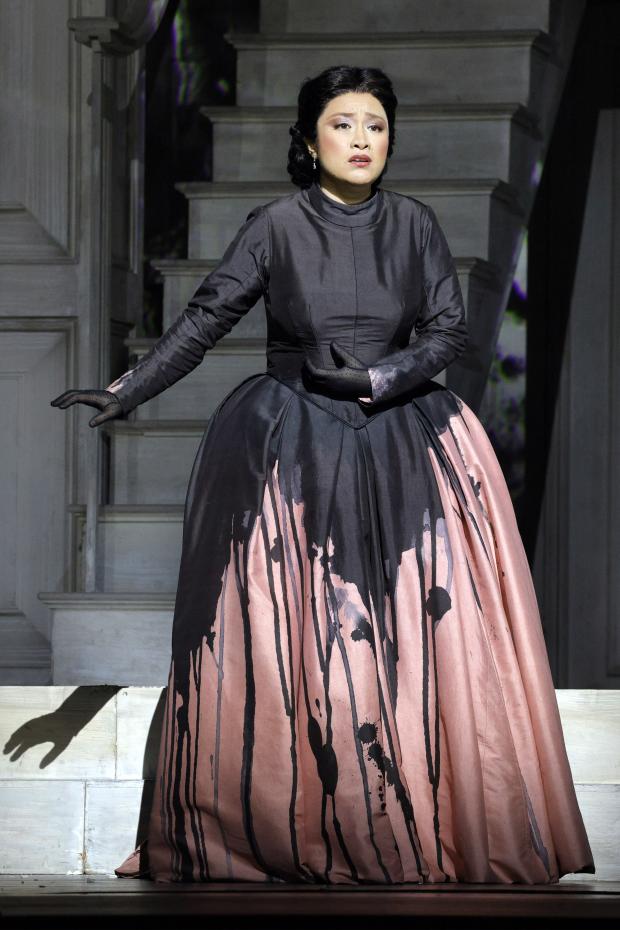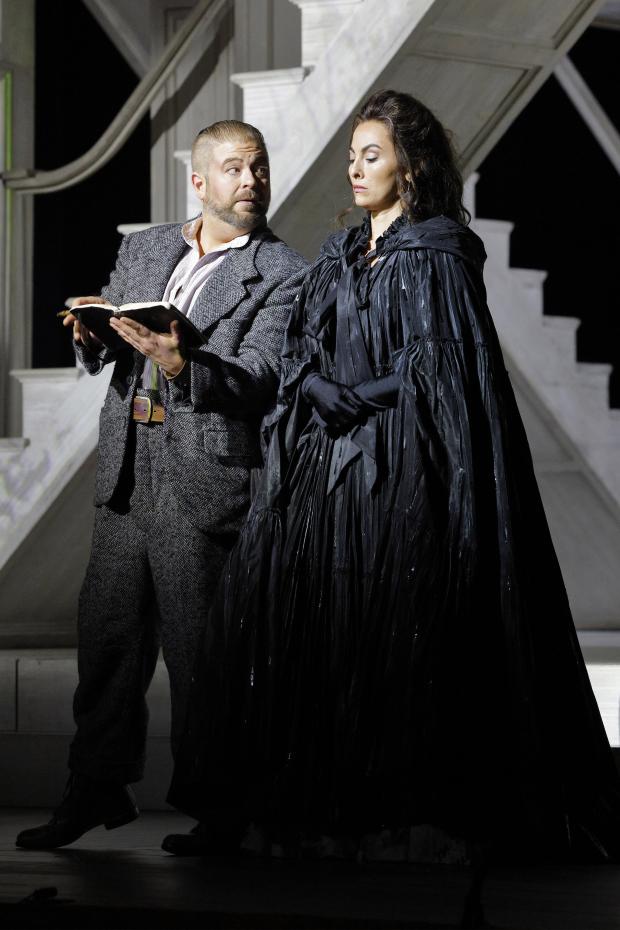Act I of Wolfgang Amadeus Mozart’s 1787 Don Giovanni (the opera is sung in Italian; in Spanish the character is known as “Don Juan”), LA Opera’s radiant season opener, is a sublime experience that made me feel glad to be alive, with some of the very best music ever composed for opera. Set in mid-17th century Seville, the story is about the legendary seducer, Don Giovanni (lustily played by tall, well-proportioned North Carolina baritone Lucas Meachem), who cuts a sensual swath across Europe.
Indeed, the number of Don Giovanni’s sexual “conquests” surpasses 1,800, which his much put-upon servant Leporello (the scene-stealing California bass-baritone Craig Colclough) lists in the funny “Catalogue Song,” wherein he sings the names of the countless women his “master” has bedded to the deserted Donna Elvira (New York mezzo-soprano Isabel Leonard), after she has confronted her onetime lover. The lovers’ many names are cleverly projected on English scenic designer Es Devlin’s moving set.
What is enraging about Don Giovanni’s amours to his abandoned lovers, their protectors and partners is that he is a great deceiver who tells countless lies to lure women to make love with him. As a nobleman, he also exploits his status and wealth in class conscious societies to bed women of all sizes, nationalities and stations of life, then callously discards them after they serve their libidinous purpose, and moves on in his reckless, relentless pursuit of pleasure.
Although the first act is largely a romp, early on, after a liaison with Donna Anna (Chinese soprano Guanqun Yu), in what may be an act of self-defense, Don Giovanni kills the Commendatore (Chinese bass Peixin Chen), her father. When Donna Anna informs her fiancé Don Ottavio (California tenor Anthony Leon) of the Commendatore’s slaying, he promises vengeance and sets out to find whoever the killer may be.
Thus, the stage is set for Act II. Following the intermission, will Don Giovanni get his just deserts and pay the proverbial piper for what Errol Flynn called his “wicked, wicked ways”? (The screen’s greatest swashbuckler starred in one of the many versions of the libertine’s saga in 1948’s Adventures of Don Juan. There have also been renditions in various mediums about Don Giovanni by/with Moliere, Lord Byron, Apollinaire, Johnny Depp, et al. In 2011 I attended an adaptation of Don Giovanni set in the Roaring Twenties with performers clad as flappers that had a Great Gatsby vibe at Zürich’s 19th century opera house, see https://intheknowtraveler.com/zurich%E2%80%99s-magical-musical-history-tour/. Mozart’s iteration has a libretto by Lorenzo da Ponte, partially based on Bertati’s Don Juan, or The Stone Guest.)
The plot and characters are enlivened by Mozart’s glorious music, which opens with the ominous strains of the “Overture,” which swiftly flows into a lilting orchestral torrent that sweeps listeners along the tide of sound. The cheerful, boastful “Don Giovanni’s Aria” is sung by Meachem with a humorous panache. The title character’s “Duetinno” with Zerlina (Chinese soprano Meigui Zhang), the bride he lecherously pursues on her wedding day, is lyrical.
Zerlina’s apologetic aria, where she beseeches her husband-to-be Masetto (California bass-baritone Alan Williams) to forgive her for falling for Don Giovanni’s charms – “Batti, batti, o bel Maestto” (“Scold me, dear Masetto”) – is lovingly rendered. Zerlina’s subsequent aria, “Vedrai, carino” (“Dearest, shall I tell you”), sung to an injured Masetto, is sexy and witty as the bride-to-be sings to her intended about his body parts that have and have not been wounded, and promises to cure him with a special remedy, so to speak. Don Giovanni’s servant Leporello’s aria likewise has a droll vibe.
Interestingly, like other Mozart operas such as 1786 The Marriage of Figaro, Don Giovanni has an important element of class struggle. Consider the first words that Leporello sings, complaining about his servitude and lot in life on the class stratified totem pole:
“Night and day toil
for those who can appreciate nothing;
put up with rain and wind,
eat badly and sleep badly!
“I want to be a gentleman,
and I don’t want to serve anymore,
no, no, no, no, no, no,
I don’t want to serve anymore!”
Considering the class conflict component that kicks the opera off, it’s almost as if the composer was named Wolfgang “Karl-madeus Marx-art”! Note that both The Marriage of Figaro and Don Giovanni appeared shortly before the French Revolution in 1789. And that the servant’s name, Leporello, sounds similar to “leper,” who were then regarded to be diseased social outcasts – Leporello likewise has a low social standing as he is nothing but a mere servant to a big shot.
Mozart had a special disdain for members of the elite who used their power and privilege to take sexual advantage of women. The villain of the Spain-set Marriage of Figaro is Count Almaviva, Grand Corregidor of Andalusia (who, like Don Giovanni in the current production, was played no less than by Lucas Meachem in LA Opera’s Figaro last February). Whereas Don Giovanni relies upon seduction, as well as the allure of his social standing and wealth, Figaro’s ignoble nobleman insists on his truly despicable “droit du seigneur” or “right of the lord,” which entitled feudal bigwigs to have sex with “subordinate” women – serfs and servants – especially on their wedding nights. This heinous practice of privileged pigs was also known as “ius primae noctis,” or “right of the first night.” (Where was the “#MeToo Movement” in the 17th and 18th centuries?)
In the Don Giovanni now on the boards at the Dorothy Chandler Pavilion, Danish director Kasper Holten, director of the Royal Danish Theatre in Copenhagen, endeavors to jazz Mozart’s 18th century work up with cutting edge stagecraft and special effects, including, as stated, revolving sets. Luke Halls’ aforementioned projections also feature immersive imagery, as well as written words, and there is one cinematic scene with the lecherous protagonist that resembles an onscreen zoom in, and reminded me of a shot in Alfred Hitchcock’s 1958 Vertigo (another piece about obsessive love and lust). Conductor James Conlon doesn’t miss a beat as he elicits the sounds of the gods from the LA Opera Orchestra, and the music is enhanced by chorus director Jeremy Frank.
Danish choreographer Signe Fabricius and English associate Anna-Marie Sullivan provide the steps for a dance that Don Giovanni throws at his villa. Andrew Kenneth Moss is the fight director, and Sara E. Widzer is the bawdy opera’s intimacy director (leave the kiddies at home for this “PG-rated” production about a smarmy if charming rake). Although I’m no expert on mid-17th century Spanish fashions, some of Danish costume Designer Anja Vang Kragh’s apparel seemed to my untutored eye to be period pieces, while other garb, such as Don Ottavio’s tuxedo, looked quite contemporary.
The references to modern day may, consciously or unconsciously, indicate why LA Opera is reviving the archetypal lech at this particular time. Is this 21st century Don Giovanni a reference to a present day elite libertine and malignant narcissist who, taking advantage of his wealth, fame and fortune, sexploits women, by his own admission “grabs them by the pussy,” and was convicted in connection to sexual assault in civil court, etc.? Call him “Don Trump-ovanni.”
Be that as it may, this splendid production about the would-be playboy of the Western world who doesn’t play by the rules is a magnificent start for LA Opera’s 2023/2024 season. And speaking of that working class hero Figaro, next up on October 21 is Rossini’s The Barber of Seville. Can’t wait!
LA Opera’s production of Don Giovanni is being performed Sundays October 1 and 15 at 2:00 p.m., and October 4, 7 and 12 at 7:30 p.m., at the Dorothy Chandler Pavilion, 135 N. Grand Avenue, Los Angeles CA, 90012. For info and tickets: https://www.laopera.org/performances/202324-season/don-giovanni/; (213)972-8001. Don Giovanni is sung in Italian, with English supertitles, has one intermission and is about three and a half hours long.



